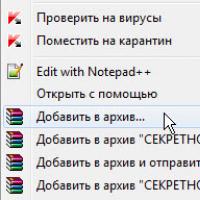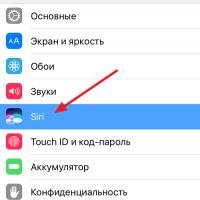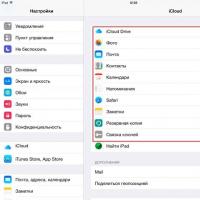What should the login be? What is the login and username when registering? Video about creating an interesting login
Hello, dear readers of the blog site. It seems like a simple question, but it still often arises for novice Internet users when they need a login and password.
It would be better if I immediately warn you and try to explain the importance of your usernames and passwords, because on the Internet they break everything, and not just where something is located.
What is “my login” and how does it differ from a username?
So, login is your individual identifier (must be unique for the service where you register). Now many services allow you to use names or nicknames written in Russian letters as your logins, but previously everyone was required to use exclusively Latin characters and numbers when writing them.
This is apparently due to the fact that the data received during user registration (login and password) is stored in the database. Therefore, when entering my login, I use the same rule that is acceptable to use in - ,,,[_],[-]. This spelling is suitable when registering for any service.
You still have to figure it out what is login, and what is a username. Very often one is different from the other. This confusion is growing from the same above-mentioned rule of using only Latin characters when registering, while on the forum, website, blog and social network where you register, it would be appropriate to use usernames (real or nicknames) written in Russian language.
That’s why you often have to fill out two fields in the registration form: login (only in Latin) and name (possibly in Russian). True, there is now a general trend on the Internet towards simplification, and there are fewer and fewer sites where you are confused by incomprehensible fields with two similar concepts.
Now often use as their login just your mailbox address or the number specified during registration mobile phone. Moreover, you can use any of these identifiers (login, phone or E-mail). It is clear that I am not talking about forums, but about sites like or.
It’s also worth coming up with your login wisely, because your personal data (full name) indicated in it can help attackers apply social engineering methods to you if you inadvertently become an object of interest for such individuals (this is how wallets in electronic payment systems, postal And social accounts, and much more).
In our digital age, we need to learn to be vigilant and overcome our innate gullibility. Don't think that no one needs you. They are needed, but not you specifically, but together with thousands more careless users like you. Accounts are stolen online, and then sold in bulk to spammers and other bad people.
In addition, please note that on most services, the the login cannot be changed later, except perhaps only by registering a new account. Therefore, try to think through in advance all the awkward moments that may arise in this regard (for example, having registered in Miralinks under the nickname of one well-known character in the world of SEO, I received questions from the administration several times about the ownership of certain sites added to this system).
A complex password is what will allow you to sleep peacefully
Well, now let’s talk about the second part of personal data, which you will need so much when logging into any service on the Internet. I'm talking about password. What it is? Ideally, this is a very difficult to select and difficult to predict set of characters, which are not always letters or numbers.
The more complex my password is, the more difficult it will be for attackers to crack my Mailbox, an account on a forum, website or social network by simply searching through dictionaries. An example of bad options would be your name typed in the Latin layout, qwerty options, 123456 and thousands of others, lists of which are available to any hacker lying around.
It is clear that you are insured in case you forget the password you came up with or lose the piece of paper on which you wrote it down. But anything that helps you recover it will help the attacker figure it out. The good old saying still applies: if you put it further away, you will take it closer.
Personally, I realized the need using a secure manager to store my passwords and logins only after the theft of funds from my WebMoney wallet and after almost all of my sites were infected with viruses. In both cases, there was a banal theft of passwords (in the first case, it seems that my mailbox with a password equal to qwertyqwerty was hacked by brute force, and in the second case, they pulled out the ones stored in open form in the file are my passwords for accessing sites via FTP).
Carelessness is always punishable, especially on the Internet, where the situation is similar to the dashing nineties in Russia. When choosing a password manager, I was guided by reviews on the Internet, and also by the fact that it was free and open source(any understanding programmer will be able to identify developer loopholes if they exist).
The latter is important, because trusting all your data to one single program is quite fraught. But if there are no “bookmarks” in the code, then opening the database without entering the master password or specifying a key file will be almost impossible, because cracking a complex database encryption key with passwords by brute force can take years even on a supercomputer.

The program is again free and open source - time-tested reliability. In general, be vigilant and do not trust even yourself in matters of security.
Good luck to you! See you soon on the pages of the blog site
You might be interested
 How to register on the social network Twitter? Yandex Account - registration and how to use the service Account - what is it, how to create or delete it
How to register on the social network Twitter? Yandex Account - registration and how to use the service Account - what is it, how to create or delete it  How to restore a page in Contact (if access is lost, deleted or blocked) How to delete your page on Odnoklassniki
How to restore a page in Contact (if access is lost, deleted or blocked) How to delete your page on Odnoklassniki  How to put a password on a folder (archive or otherwise password protect it in Windows) Authentication - what it is and why two-factor authentication is now widely used How to create a page and group on the Odnoklassniki social network
How to put a password on a folder (archive or otherwise password protect it in Windows) Authentication - what it is and why two-factor authentication is now widely used How to create a page and group on the Odnoklassniki social network  Skype - what is it, how to install it, create an account and start using Skype
Skype - what is it, how to install it, create an account and start using Skype  Registration and login to your page in Contact - what to do if you can’t log into VK How to delete mail and mailbox on Mail.ru, Yandex and Gmail
Registration and login to your page in Contact - what to do if you can’t log into VK How to delete mail and mailbox on Mail.ru, Yandex and Gmail
If you are an active Internet user, then you have probably come across such concepts as “login” and “password”. The fact is that dating sites, social networks, forums and many other resources allow communication on their pages only to registered users. Today we want to talk in detail about what a login is and the rules for creating it.
Registration
Each site on the World Wide Web can be compared to an apartment building. When you decide to “settle” in it, you perform the usual sequence of actions:
- You come up with a login and give your “apartment” a number.
- When you come up with a password, you create a “key”.
Login - what is it? This is your unique name on this site, consisting of Latin letters and numbers. Sometimes you come up with it yourself, and sometimes you use the system’s hints. In some cases, this role is played by an email address or personal number cell phone.
What is a login during registration? Before you can communicate with other users of the site, you will have to fill out a short questionnaire. In some cases, the system asks the user to come up with a name. What is a username? This is the same login you will need to log into the site. How to create a login and password? You can read the answer to this question further.
What should the login be?
Many people make the mistake of coming up with ridiculous names for themselves. This may be appropriate if you are communicating with friends or people you know well. However, do not forget that your letter may be received by a business partner or subordinate. In this case, “Paws” and “Kits,” as you understand, are completely inappropriate.
Tip: to come up with a beautiful and memorable login, combine several letters of your first and last name in one word. Experiment until you are completely satisfied with the result.
A password is a secret key that allows you to log into your account. Therefore, it should consist (ideally) of numbers and Latin letters, and not represent any sequence.
You can use the same login on different sites. But this will work provided that the name is not taken by another person. We recommend, just in case, to write down the data in a special notebook so that you can use it if necessary. If you do not take precautions and forget your password and login, you will have to recover them.
Asterisks (*) indicate required fields.
RULES OF REGISTRATION AND CONDUCT ON THE SITE
By registering on the site, you agree to the following rules:
1. When communicating on the site, both with the administration and with other club members, you must behave correctly; swearing and rude forms of communication are prohibited. All forms of national and racial intolerance are prohibited.
4. For violating the rules of conduct, you may be temporarily blocked or deleted permanently. We don't have to motivate this in any way.
5. We, in turn, undertake not to disclose user data or transfer it to third parties. We are not responsible if user data is stolen as a result of a hacker attack, but we will prevent this in every possible way.
6. The site is not liable to users for moral damages and other possible losses associated with the use of the site.
7. If you do not agree with the above rules, you have the right to refuse registration.
REGISTRATION INSTRUCTIONS
LOGIN
Obligatory field. As a login, come up with 1 word without spaces. This is something like your nickname on the site. The login can be entered in Cyrillic or Latin. Case matters, i.e. Marina and marina are 2 different logins. The minimum login length is 3 characters, the maximum is 15 characters.
Acceptable logins:
Marina_Alekseeva
Invalid logins:
Marina Alekseeva
PASSWORD
Obligatory field. The password is entered in Latin. The minimum password length is 3 characters, the maximum is 15 characters. Do not enter names or date of birth as a password; such passwords are easily hacked. It's better to come up with a combination of letters and numbers.
Strong passwords:
Weak passwords:
Obligatory field. Enter your valid email, because You will receive an email with a link to activate your account. Without activation, you will not be able to log into the site using your username and password. Attention! The activation link is only valid for an hour.
E-mail, for example, looks like:
[email protected] and so on.
AVATAR
Optional field. You can upload your photo or any picture as an avatar. It is automatically cropped to 90x90 pixels. Attention! It is better not to upload photos larger than 2 Mb. If your photo “weighs” more, crop it first in any way graphic editor. The smaller the photo, the faster it will be uploaded to the server.
You can also upload the photo later from the settings of your page in your account.
CODE FROM THE PICTURE
Obligatory field. You must enter the code from the picture in Latin, which is a combination of small letters and numbers. This check was introduced to protect the site from so-called spam bots and other malware. This way it checks whether you are a human or a bot.
AFTER REGISTRATION
After registering, you will receive a letter to your specified e-mail in which you need to click on a link that looks like:
http://site/activation.php?login=mylogin&code=ed3d2c21991e3bef5e069713af9fa6c
A website page will open in your browser with a message stating that you have confirmed your e-mail. Now you can log into the site using your Login and Password.
IF THE REGISTRATION CONFIRMATION LETTER HAS NOT RECEIVED
Usually the letter arrives immediately or within a few minutes. If this does not happen, check to see if it is in the Spam section.
You may have made a mistake when entering e-mail addresses, register new account and enter the correct e-mail.
If, after clicking on the link, you receive a message like “You have entered the page without a confirmation code!”, then most likely you wrote a space or other invalid character in your login. Try registering a new account in accordance with the rules.
If after clicking on the link you receive a message like “Error! Your email is not confirmed!”, then most likely you did not copy the link completely. Try to copy the entire link or click on it, or register a new account in accordance with the rules.
Your previously inactive account will be deleted automatically.
I CAN'T LOG IN WITH MY USER ID AND PASSWORD
Please enter your username or password carefully.
Check to see if the CapsLock key is turned on (sometimes there is a padlock on the key), which makes all letters written in capitals.
The case of letters (capital and uppercase) matters when writing your login and password.
Is the correct input language selected?
When copying a login or password from a letter, make sure that you do not include an extra space.
In other cases, you can contact the administrator through the Contacts page, describing the essence of the problem.
I DON'T REMEMBER MY PASSWORD
To resume access to your account, you need to follow the link Forgot your password? and indicate your login and e-mail. If you have entered everything correctly, a letter with a new password will be sent to your e-mail. Log in to your account using your Login and new password and preferably change the Password.
IF YOUR LOGIN OR PASSWORD IS ENTERED INCORRECTLY 3 TIMES
If you see the message “You have entered your login or password incorrectly 3 times! Wait 15 minutes before trying again!”, this means that you have entered your Login or Password incorrectly 3 times in a row. In this case, the ability to log into the system from your computer will be blocked for 15 minutes. After 15 minutes you can try again. This is done to prevent automatic guessing of passwords for your accounts. various programs for burglary.
TERMS
Email- Email
Avatar- Your photo or other image linked to your login.
Account- it's your Personal Area, Your page with settings and other features. Each person on the site has their own account.
Login- something like a nickname on the site.
Password - secret code to enter the site.
Spam bot- a program created for the purpose of sending advertising messages - spam. More advanced versions of spam bots are able to register on websites, forums, social networks and send annoying and often malicious letters and messages.
I DO NOT FIND THE ANSWER TO MY QUESTION IN THIS INSTRUCTION
For any questions, you can write a message to the administrator from the Contacts page, describing the essence of the problem.
We live in an information age where anyone can hack your email, your social media profile, or your website if you have one.
How to come up with a login and password for registration so that no one hacks you? Very simple…
It is extremely important to have on hand reliable protection that even the most powerful hackers will not be able to hack you.
I always thought this was a little nonsense, well, who needs the data of this or that person. But, if you think sensibly, then people who know how to hack can always do it. If it’s not clear, then I’ll try to give an example that it’s like the desire of a pickpocket who has gotten stuck to snatch an old lady’s purse on a bus.
That is, hackers can improve their skills in this way. Although, everyone may have their own motives, which is why I decided to write a detailed post on how you can protect your Internet resources and data.
How to come up with a login and password for registration
Now, everywhere on the Internet, what do you constantly enter? That’s right: passwords and more passwords, so it’s important to register ones that no one will ever hack.
A good password should meet the following modern requirements:
- must contain not only Latin letters, but also numbers;
- its length should be from 8-12 characters and this is the minimum;
- It is best to use all letters of your keyboard for the password;
- It will be great if your password has spaces, and several;
- do not try to create passwords that indicate your date of birth or street and house number;
- no need to enter the password like the letters that are placed next to each other on the keyboard.
Like these ones simple rules, which you should consider when registering passwords for your social network profiles, for example: in VK, facebook, twitter, google plus . Let's say, if you register on a one-time forum, for example, just to download something, then you can enter anything.
By the way, an excellent rule, try to update passwords on your sites from time to time, this will complicate and even scare off possible haters. And best of all, attach authorization via SMS to your sites.
Even if they find out your username and password, they still won’t be able to log in, since they will need to gain access to your mobile phone.
Secure login and password
There are many ways to help you find a complex password.
- It must not be understandable. How we come up with a password is basically a word and some numbers that mean something. Think of a word that is not in the dictionary, then add numbers to it that, in your life, mean nothing.
- Come up with a few words, and put some kind of symbol, for example, a comma, in the very middle of each one. Here's an example “Better!!iipa,ro l”. It seems to be a phrase: “The best password,” but try to find it again, because there are two exclamation marks and commas.
- Enter the password in upper and lower case letters. Here: "MyBirthday229", such a password will also be difficult to guess.
- In general, it would be cool if you put a word in your password and add your non-existent date of birth to it. Even if hackers hack you, they will check your date of birth, your relatives, but not others. Here's a simple example: "Sanechek19550202". As you can see, the numbers here don’t mean anything at all, so it’s extremely difficult to find one.
- We take some book or magazine and write down a phrase there, which, again, does not fit into your life. For example, the following type of password cannot be guessed "Valery Meladze in Minsk". The most important thing is that you don't forget it.
Well, I think you’ve figured out passwords, now you know what a strong and complex password that can be used to register mail should look like, social networks, on websites, forums, YouTube.
How to come up with a login
The most important thing you need to remember is that the words you use in your login should not be used in your password and vice versa.
To find your login, you can:
- use the standard generator on the website;
- come up with something like this from your past or vice versa from what you dream of coming to, for example: business-cool;
- can be taken from your hobby;
- a profession in real life would also work;
In short, there are a lot of free words that you can use to log in to any website.
I hope that I didn’t miss anything and that the article on how to come up with a login and password for registration turned out normal. If I missed something, then sorry, I can add.
That's all for me, thank you for reading this post.
Sincerely, Yuri Vatsenko!
All blog articles
Quick navigation on this page:
This morning I registered in another service and thought about how to create a login and password in such a way that they would differ from my main logins and passwords, but at the same time be secure on the one hand and convenient on the other. What my thoughts led me to - read on.
Whatever you name the ship, that’s how it will sail, or choose a name
Choosing a login is a subjective thing that depends primarily on personal preferences. I would like to note only two main points here:
Anonymity versus recognition
When choosing a login, think about what you would like to achieve - complete uniqueness and recognition, or, on the contrary, anonymity?
In the first case, you need to take a login that is not repeated anywhere else - if you are present under this name on different sites (blogs, forums, etc.), then you can be identified.
If you have directly opposite goals, then, on the contrary, you need to take the most common names and nicknames.
Safety
Basically, this point is relevant if you choose a login for the admin panel on your website or on some blog/forum/service, where all users are shown one name (for example, Masha Petrova), and you log in as masha_petrova .
It is known that many WordPress and other CMS blogs are regularly attempted to be hacked by brute-force attacks. Unfortunately, this happened to me a couple of times too - I stood easy password of five digits. As a result, the attacker logged into the admin panel and uploaded a virus to the site.
This would not have happened if I had thought about security when choosing a login. Namely, my login was admin, and it is for this that most scripts involved in brute force—password brute force—are designed.
It would be enough to choose a different login - and brute-forcing passwords would no longer be scary.
In this regard, for admin panels you cannot select names such as admin, administrator, or names that match the name or domain of the site.
Also, you shouldn’t expose your mailbox too much, especially if it includes your login - for this reason, I don’t particularly recommend using it on site pages.
Choosing a password
As you know, user passwords in databases are stored in encrypted form (usually the MD5 algorithm and its modifications are used). This means that if someone gains access to the database, they will not have your password, but will have a sequence of characters - something like (the example given is the md-5 hash of the word “pass”).
An attacker will not be able to recover your password from this sequence of characters (the algorithm does not allow it), but he can use software (which exists in large quantities in the public domain) start searching for passwords - the program will create their md5 hash and compare it with the existing hash until it finds the correct option.
Thus, for example, you can guess the password for the admin panel of most WordPress blogs (having a hash and if the blog itself does not use additional security methods, which almost never happens).
Searching for a password is a matter of time and computer power. Therefore, the longer the password, the more time it takes to guess it. For the same purpose, uppercase and uppercase letters, numbers, as well as special ones are added to the password. symbols - then the number of combinations of symbols that the program will have to sort through increases billions of times, and brute-forcing a password becomes possible only in theory, but in practice it is unrealistic, since it can take years.
The conclusion that follows from this is that the password should be as long as possible and include all possible options characters. As a rule, the recommended length is 12 characters, but there is no clear rule here - no one forbids taking 11 characters or 20 characters - you need to weigh the significance of the password, the number of times you will have to enter it per day, and the likelihood of an attempt to crack it.
If you would also like to have a memorable password, then it is not recommended to use strings of words directly; it is better to dilute them with special characters, numbers, etc.
No security questions
Security questions are one of the vulnerabilities that attackers often use when hacking into accounts. It happens that a person chose a complex login, an even more complex password, but as an answer to the secret question he indicated his mother’s real maiden name, which is often also included in the top 20 most popular surnames in Russia. The result is that the account is hacked.
To avoid such situations, I try to never indicate answers to secret questions in email and other services that can be revealed by brute force or, especially, that can easily become known to third parties.
 Order 343 mail. Order by Russian post. Consequences of failure to appear in court when summoned
Order 343 mail. Order by Russian post. Consequences of failure to appear in court when summoned How to put a password on a folder on a Windows computer without and with programs
How to put a password on a folder on a Windows computer without and with programs Pluton – Free Bootstrap HTML5 One Page Template
Pluton – Free Bootstrap HTML5 One Page Template History of ZX Spectrum: Myths and reality New Spectrum
History of ZX Spectrum: Myths and reality New Spectrum Voice assistant Siri from Apple Siri functions on iPhone 6s
Voice assistant Siri from Apple Siri functions on iPhone 6s How to roll back to a previous version of iOS?
How to roll back to a previous version of iOS? Unlock iPad in four days
Unlock iPad in four days